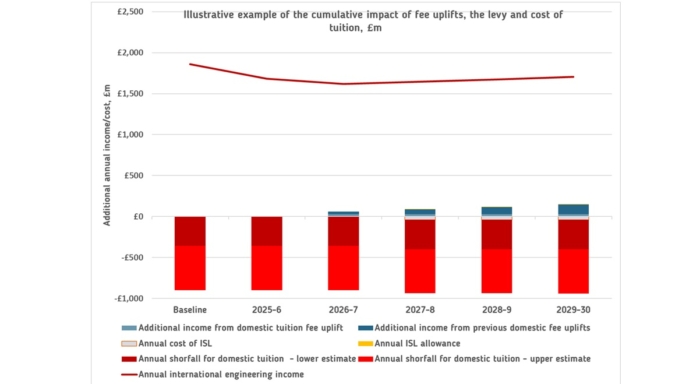EPC Chief Executive Johnny Rich delivers his takeaways from the Labour Party Conference and what it all means for Engineering academia.
As I have done for the past few years, I attended this week’s Labour Party Conference in Liverpool. I don’t spend time in the hall listening to the speeches I could watch from home. Instead, it’s the fringe events and discussions with a congregation of political insiders that make it worthwhile.
There are also occasional opportunities to collar politicians and shove our latest evidence of Engineering academics’ research impact into their hand.
That said, this year, the flow of HE-related announcements from the hall and the reactions in the hotels and function rooms beyond came thick and fast. Here are my Conference takeaways…
Maintenance grants
Appropriately enough I was in a HEPI event on student funding when news hit that Education Secretary (and Labour Deputy Leadership hopeful) Bridget Phillipson announced that she would reintroduce “targeted” maintenance grants for some students in England. There was a cheer in the room because most of the audience – myself included – had campaigned for this.
It’s profoundly welcome and means England’s poorest students will no longer face the highest debts to study at university. However it comes with two stings.
The first sting is that this will be available only to students studying priority subjects – ie. those courses addressing skills shortages in the eight target sectors identified in the Industrial Strategy. Given that four of ‘the IS8’ are engineering sectors and at least two of the others are what you might call highly adjacent, this might appear good news for engineering academia.
However, in practice, while it might make it more affordable for some students to study engineering, it won’t make it any more affordable for universities to teach it. As the EPC has stated to government repeatedly, there is already a shortfall in all parts of the UK between the teaching funding for a domestic student to study engineering and the costs of delivering their course.
Maintenance grants do nothing to close that gap so telling the poorest students that they can have a grant so long as they study what the government tells them to is not going to address skill shortages.
The availability of places on courses is far more linked to another announcement from Phillipson, which is the second sting.
The International Student Levy
The idea of a 6% levy on international student fees was floated several months ago and hasn’t gone away. In fact, it has continued to float stubbornly until finally this week Phillipson said that this was how she intended to pay for the grants without asking the Chancellor for money.
Politically, it’s a blinder, because it divides the opposition to the levy. The Russell Group, for example, many of whom have most to lose from the levy, won’t want to be seen to be opposing grants for the poorest students.
For EPC members, however, the levy is particularly troubling. Engineering has some of the highest rates of international students of any discipline and in many universities where international number are relatively low, it is engineering that attracts the majority. That’s because on the demand side, not only is UK HE respected worldwide, but our engineering courses especially so. Meanwhile, on the availability side, it is because engineering attracts so many international student that it can afford the plug that funding shortfall I mentioned.
While I hope no university regards their international students as cash cows, it is undeniable that, without them, most engineering courses would be financially nonviable on domestic fees and Strategic Priority Grant funding alone.
Political consultancy Public First recently calculated that the levy would mean a fall of 77,000 international students as universities either pass on the cost or reduce the availability of places. Even if universities choose to freeze prices and swallow the cost of the levy, that’s a cut to budgets that do not need any more pressure right now.
Those cuts would fall disproportionately on engineering courses and departments, especially at postgraduate level where more than half the students nationally are international. That would means courses being dropped and possibly departments closing. It would do far more to damage to the supply of IS8 skills than any marginal gain from a few extra students picking engineering because it qualifies them for a grant.
The governments argument however is that it would redistribute money from universities with lots of internationally students to those with fewer and to further education colleges. However, by tying the levy to the grants, they’ve given that argument away. The levy will barely raise enough to pay for the grants unless they’re the bar for eligibility is set very high. It can’t be claimed they’ll be money left to redistribute around tertiary education too.
Even if there were, it would be a redistribution from engineering and all its international students to institutions with either minimal engineering courses or none at all, because, if they did, have the, they’d probably be attracting international students of their own too.
Post-16 White Paper
These announcements may figure in the long-touted White Paper on tertiary education and skills which was due to be released in Spring. Then Summer. Then Autumn.
Around the Conference lots of people who claim to know about this stuff, but may just be repeating each other’s rumours, said that it may now be published as soon as next week. Certainly Phillipson in a fringe event I attended dropped enough references to suggest it is in its final stages of internal approvals.
It is clear its main focus will be further education – perhaps creating a more unified tertiary system with HE – but it seems it will also include changes to regulation of HE in England and something on research (possibly greater alignment with the IS8 again). Skills Minister Jacqui Smith also referenced the need to do more on university financial stability which may also be in the White Paper or may be what the regulation changes will be about. Then there may be further work to do on establishing the Lifelong Loan Entitlement (which is also – for now – going to be aligned with IS8-supporting qualifications). That may make an appearance.
Whenever it comes, it seems likely to be the biggest package of changes in English FE and HE for some time. Waves in Westminster tend to create ripples through the devolved nations too.
Targeting two-thirds
Back in the hall, PM Keir Starmer’s speech formally abandoned his predecessor Tony Blair’s pledge to get half of young people into HE (a target that was reached in 2019 after nursing became a graduate profession).
This was another piece of cunning political framing because ‘abandoning’ that pledge may appear to appease those on the political right who believe that too many young people go to university. Meanwhile, it’s not saying anything of the sort, because there is a new target: to reach two-thirds of under 25s going into HE or a “gold standard apprenticeship” (which apparently is a way of saying a higher apprenticeship, ie. Level 4 or above) or a higher technical qualification by 2040. That would entail a doubling of higher apprenticeships and HTQs.
We will need to watch the rhetoric (and the White Paper) on this to see whether it really amounts to a loss of faith in the long-established and evidence-informed efforts to meet the need for more degree-educated workers in the economy or a shift to indulge an anti-university mentality that our colleagues have been suffering in the USA.
Industrial Strategy
As you may have realised by now, Labour wants to make it clear that the industrial strategy is the rudder they are going to be using to steer the economy. It was therefore timely that this was the theme of the fringe event hosted early on Monday morning by the National Engineering Policy Centre, a collective voice for the professional engineering institutions, convened by the Royal Academy.
On behalf of our members, the EPC works closely with the NEPC feeding into their lobbying messages, especially on education and skills. Among others on the panel was Dr Alice Bunn OBE, CEO of IMechE, who made one of the most useful contributions. She praised the Industrial Strategy and the seriousness of the government’s pursuit of its stated goals, but what was missing in it, she argued, was a workforce strategy.
With all the announcements that followed, by the end of the Conference, it was clear how Labour hopes to fill that gap using tertiary education. The workforce strategy appears to be best summed up by saying, “If it ain’t aligned with IS8, it ain’t getting on the plate.”




